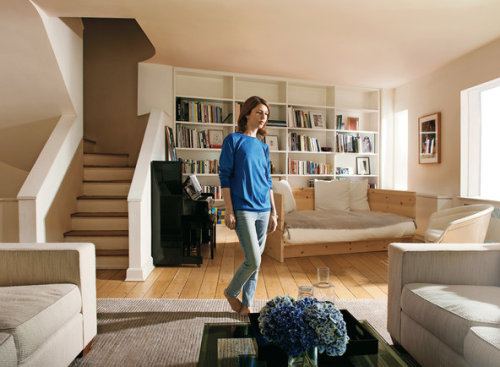
In Conversation | Lee Radziwill and Sofia Coppola, on Protecting Privacy
Sofia Coppola’s own life is the very picture of elegant discretion. Who better to critique a celebrity-obsessed generation that overshares and hyperconsumes?
SOFIA COPPOLA’S NEW MOVIE, “The Bling Ring,” tells the true story of a gaggle of San Fernando Valley teenagers so obsessed with the trappings of celebrity that they decided just to steal them. In 2008, this group set off on a nine-month spree in Hollywood, looting more than $3 million worth of jewelry and designer clothes from the homes of Lindsay Lohan, Paris Hilton and other TMZ-tracked starlets — in some cases breaking in by just walking through an unlocked front door. (They had Googled the addresses.) Unlike Coppola’s earlier films, which approach the follies of youth with a sweet sense of melancholy, this one seems to raise a kind of parental alarm. Coppola’s interest in this subject matter was sparked in part by having two young daughters, Romy, 6, and Cosima, 4. Here she chats with her friend Lee Radziwill about the current state of celebrity culture — and how this glittery world fascinates her as a filmmaker, and terrifies her as a mother.
Coppola: Lee, I’m so sorry you had to watch my loud and obnoxious film!
Radziwill: Not at all. I thought it was really interesting, and I was interested in why you chose to do this now.
Coppola: When I read the Vanity Fair article about these kids, it summed up everything that I think is declining in our culture. And it just doesn’t feel like anyone is talking about it. Kids are inundated with reality TV and tabloid culture so much that this just seems normal. When I go to a concert, everyone is filming and photographing themselves and then posting the pictures right away. It is almost as if your experiences don’t count unless you have an audience watching them. There are even videos of kids having their sweet-16 birthdays and they want a red-carpet V.I.P. theme. This movie was about an extreme version of this.
Radziwill: Does that fascinate you or frighten you or bewilder you?
Coppola: It frightens me, and it just seems like this trash culture is becoming acceptable as mainstream culture.
Radziwill: I find it sad that that’s the way culture is going.
Coppola: Yeah, I guess I was hoping to have some kind of discussion about it in the hopes that we can try to improve things. I wanted at the beginning of the film for it to look as enticing as possible, so you could sort of understand why these kids were obsessed with that world and go along with the ride, so we’re not just looking from a distance. I wanted you to try to experience it through their eyes. But I also wanted to kind of catch up with them, and then for people to start to have other feelings about it.
Radziwill: Imagine if your girls were as obsessed with celebrities and clothes! You would be in such despair.
Coppola: I know. I don’t know if I would have been as interested in this if I didn’t have daughters and know that they’re growing up in this world. I think that’s the way that it’s affecting, because these are kids in the movie, they’re so young and impressionable.
Radziwill: It was amazing to me that there were no alarms and that nobody was ever home.
Coppola: Yeah, they never turned on their alarm. The Bling Ring went to Paris Hilton’s house like six times before she noticed. I think she has so much stuff that it took a while before she noticed that someone had broken into her house.
Radziwill: Did you actually film in Paris Hilton’s house?
Coppola: Yes, she was really helpful to us.
Radziwill: Amazing that she let all that be photographed.
Coppola: I know, I was surprised. She wasn’t there, but she let us into her closets and we were in her bathroom. I think it was also this idea of no privacy — no privacy, or mystery or anything.
Radziwill: It seems nothing is private anymore. That must particularly fascinate you, because you have such a sense of mystery about you. I find it so amazing that you’ve managed to keep your privacy and keep your mystique. And I think that’s one of the things that has attracted such curiosity about you, because it’s the antithesis of everybody else.
Coppola: To be private seems normal to me. In a magazine recently there was some personality talking about some private health issue, and I thought, Why not keep that private?
Radziwill: You keep yourself at a distance without being unfriendly. You have dignity, which is really rare in the entertainment world. Everybody wants to be out there until you’re so sick of their faces and their magazine covers that you think, Oh no, not again. With you, at first I thought, Well, she’s incredibly shy, but I understood it so well.
Coppola: I also appreciate that you are a fellow suspicious person. I remember you saying that you are suspicious of people, which I am. So it’s always nice when you become friends with someone who sees things in a similar way.
Radziwill: What do you think made these kids that way? Was it their upbringing, their parents who didn’t give a damn?
Coppola: I feel like they didn’t have a strong family culture. So probably a combination of that and then being bombarded with those values. I try to be empathetic. You can’t totally blame them, because they’re young and they’re being shown that this is what’s valued in that society. But it’s so important, the values of your family.
Radziwill: Now, your family is very close. I was wondering if your great serenity and calm came from your childhood?
Coppola: Oh, my mom is very calm and quiet, so I think I got that from her. Because my dad is passionate and loud.
Radziwill: But you had a very happy childhood?
Coppola: Yeah, it was always interesting and I really enjoyed that my parents always included us in their lives. So we got to be around all these interesting people and go on adventures. I mean there definitely were hard times, but —
Radziwill: What was the hardest time?
Coppola: Well, as a teenager losing my brother. He died in a boat accident when I was 15 and he was 22, and we were very close. I have one brother now, Roman. I think our family is so close because we would go on location with my dad sometimes, and we weren’t around neighborhood kids and so we had to hang out with each other and be friends with each other.
Radziwill: What location interested you the most?
Coppola: The Philippines for “Apocalypse Now” was the most exotic. I was really little. I was about Romy’s age. We were there for more than a year. That was the most exotic and fun, but I always liked to go on location. When we moved for “The Outsiders” to Tulsa, Okla., my parents just put us in the local school. So I felt like I got to really have a sense of different kinds of people. My dad was always very charismatic and exciting and doing interesting things and having people over and blasting opera and cooking, and so I have good memories. We did not have a boring childhood.
Radziwill: Your choices in film are so interesting and so original. What attracts you to the totally different films that you’ve done?
Coppola: I feel like when I finish one, the next one is always a reaction to the one before. So after I did “Marie Antoinette,” which was so decorative with so many characters, then I wanted to make “Somewhere,” where it was just two characters, really simple. And then after that, which was so simple and slow paced, I felt in the mood to do this kind of gaudy, flashy, faster-paced one. But I feel like I’m usually just naturally drawn to something. I don’t know what I want to do next, but I feel like doing something beautiful after this.
Radziwill: Would you like your children to go into film?
Coppola: After seeing “Cinderella,” Romy keeps telling me that she wants to be on the Broadway stage. I’m hoping she’ll outgrow that. We’ll see. Romy is in the Girl Scouts and I was around this group of 6-year-olds, and we were talking about things and a few of them said, “I want to be famous.” I thought, Where does that come from? I don’t think we knew about that when we were 6 years old.
Radziwill: I’ve often thought — even though it’s hard to give him even more credit than he has had — that Andy Warhol must have started a lot of 15 minutes of fame.
Coppola: I feel like now is the epitome of that idea.
Radziwill: It’s such an amazing prediction from somebody who died a good 25 years ago. And it wasn’t spot on then as far as I could tell. Maybe in Andy’s circle, it was starting, but I think he was brilliant foreseeing this.
Coppola: I would be very curious what he would think now.

